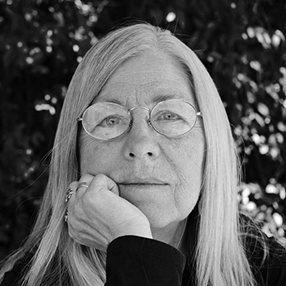1967, Girl and Snow
On nights like this, she sleeps with the car’s jack handle
in her hand, the smell of oil and metal oddly comforting
in such a public place. She keeps her clothes
in a cardboard box on the ’54 Chevy’s back seat,
along with a green wool blanket, two towels, a bag
of books. And tonight she piles blouses, blue jeans,
sweater, skirt—all of it—on top of her body, hunkering
down low on the front seat. She’s parked beneath
the brightest overhanging street light she could find
at the edge of this shopping mall parking lot, slammed
the door locks down tight. Tomorrow, she’ll drive
across town, tell a pack of lies to a do-gooder doctor.
She’ll lie about her name, her address, her age—
she’ll invent a husband. After the impossible
calendar questions, the awkward, back-opening
gown, the cold feet in iron stirrups, the knees
spreading, the gloved hand pressing, the fingers
probing—the earnest-faced doctor will tell her
(while pulling gloves off, while tossing them
into a gray metal bin), will tell her: yes. A baby
is arriving in late August—as if
she should expect a visitor, maybe stepping off
the Greyhound bus, suitcase in hand—
and she remembers how her grandmother would call
her period the unwelcome visitor, how she’d say
the only thing worse than the monthly visitor
is no visitor at all. The doctor will say everything
looks fine. He’ll say No charge for today. He’ll smile a little,
shake her hand. The best he can do.
Then he’ll leave her alone in that white, white room
and she’ll button up her wrinkled work uniform, slip out
onto the street, and make her way back
to the shopping mall to work the snack bar’s sorry
evening shift, serving coffee, burgers and fries to bored
store clerks and tired housewives. Soon, like everyone else,
her high school principal will notice the swelling arc
of her belly, and he’ll call her into his windowless office,
sit her down on a metal chair, and recite
district policy excluding pregnant students
from attending school. He will insist
it’s for her own good. The girl will say he’s wrong.
She’ll say she’s not pregnant at all. He’ll call in
the kind, freckled woman who teaches history, and the girl
will deny it again. She’ll deny it
over and over—to all of them—determined to hold them off
until graduation in June. Spring will be long, and filled with rain.
But tonight, large flakes of snow hover in the light
and she thinks of her mother, scrambling toward the promise
of a job—her mother and the five younger kids, sleeping
600 miles away on the floor of a rented house in a warm
desert town this girl has never seen, and she starts the car, lets it run
a few minutes with heater on and the urgency
of Grace Slick’s “Somebody to Love” on the radio,
and she pulls the blanket close around her shoulders, imagines
the dense, pressed asphalt under the car, and the ancient
earth beneath the asphalt, and she watches
the snow grow heavy, pile up, darkening.
Copyright © 2021 by Corrinne Clegg Hales. Originally published in Poem-a-Day on March 3, 2021, by the Academy of American Poets.
“I began working on this poem several years ago and abandoned it, unable to get it right. Later, during the Trump years, I found myself writing a series of poems focusing closely on the everyday lives of individual women—both from my own lived experience (as in this poem) and from the experiences of other women I’ve known, learned about, or imagined. I wanted to explore more deeply the various ways we come to inhabit our bodies and minds, the ways we navigate—emotionally and physically—the specific situations we encounter. And I wanted to call attention to some of those situations. In that context, I came back to the early drafts of this poem with a renewed sense of urgency and purpose—and the pieces finally came together.”
—Corrinne Clegg Hales

